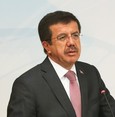
Over "ill-advised" and "unsupportable" additional steel and aluminum tariffs enacted by Washington, Economy Minister Nihat Zeybekci announced Thursday that Turkey will start imposing tariffs on nearly two dozen U.S. products, ranging from cars to sunscreen.
The tariffs will be imposed on imports of U.S. coal, paper, walnuts, almonds, tobacco, unprocessed rice, whisky, automobiles, cosmetics, machinery equipment and petrochemical products.
"The total tariff burden today being imposed by Turkey on the U.S. is commensurate with the additional costs Turkey faces due to the tariffs imposed on it by the U.S.," Zeybekci said in a statement. "They are proportional, measured and designed to protect Turkey's interests, while encouraging dialogue."
According to documents filed with the World Trade Organization, Turkey will slap $267 million in tariffs on $1.8 billion worth of products that the United States exports to Turkey.
The tariffs, which were to take effect Thursday, are in retaliation for President Donald Trump's decision to tax foreign steel and aluminum. The U.S. says the metals imports pose a threat to U.S. national security. The move has enraged traditional U.S. allies such as the European Union, Canada and Turkey.
On Friday, the 28-nation European Union will start taxing a range of U.S. imports, including Harley-Davidson motorcycles and cranberries.
"We cannot and will not allow Turkey to be wrongly blamed for America's economic challenges," said Zeybekci.
The U.S. tariffs come to $267 million on $1.1 billion in Turkish steel and aluminum shipments to the United States.
U.S. President Donald Trump decided in March to impose import duties of 25 percent on steel and 10 percent on aluminum, drawing criticism from other countries for heightening the risk of a global trade war.
The U.S. tariffs have been imposed on Europe, Canada and Mexico, some of its biggest trade partners since June 1, after their temporary exemptions expired.
The United States is the fifth largest country where Turkey exports its goods and trade volume amounted to $20.6 billion in 2017, official data showed.
Turkey remained committed to active, robust and reciprocal trade relations with the United States, Zeybekci said.
The sources previously said Turkey's move came after its attempt to carve out an exemption to the tariffs remained "inconclusive due to Washington's current stance."
Turkey's measures are in line with the losses caused by hurdles to Turkey's iron and steel exports to the U.S.
Previously, Economy Minister Zeybekci called the tariffs "unacceptable" for Turkey. Following the U.S. decision, Zeybekci also asked Commerce Secretary Wilbur Ross to exclude Turkey from the tariffs.
In late April, Deputy Prime Minister Mehmet Şimsek met with U.S. Treasury Secretary Steven Mnuchin in Washington and discussed the issue.
Currently, about 90 percent of aluminum used in U.S. manufacturing is imported, as well as one-third of all steel. After the tariffs were announced, industry groups said consumers would face the brunt of the tariffs due to increased prices for items ranging from beer to cars to thousands of other items built or packaged with the metals.
In 2017, Canada led the way in the country's imports of steel last year with 5.8 million tons, while the share of Canadian steel in the country's steel imports was 17 percent, followed by Brazil with 14 percent, South Korea with 10 percent, Mexico with 9 percent and Russia with 8 percent.
Turkey came sixth in the country's imports with 6 percent last year. Other countries from which the U.S. imported steel were Japan with 5 percent, Germany with 4 percent, Taiwan with 3 percent and China with 2 percent in this period.
According to Turkish Statistical Institute (TurkStat) data, Turkey exported approximately $13.8 billion in steel and steel goods last year, while $1.2 billion, about 9 percent of exports, was made to the U.S.
